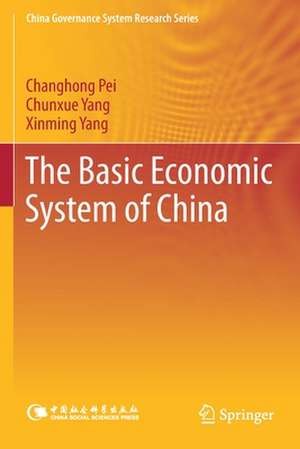The Basic Economic System of China: China Governance System Research Series
Autor Changhong Pei, Chunxue Yang, Xinming Yangen Limba Engleză Paperback – 14 aug 2020
| Toate formatele și edițiile | Preț | Express |
|---|---|---|
| Paperback (1) | 694.69 lei 6-8 săpt. | |
| Springer Nature Singapore – 14 aug 2020 | 694.69 lei 6-8 săpt. | |
| Hardback (1) | 700.94 lei 6-8 săpt. | |
| Springer Nature Singapore – 4 iul 2019 | 700.94 lei 6-8 săpt. |
Preț: 694.69 lei
Preț vechi: 817.28 lei
-15% Nou
Puncte Express: 1042
Preț estimativ în valută:
132.93€ • 142.15$ • 110.83£
132.93€ • 142.15$ • 110.83£
Carte tipărită la comandă
Livrare economică 17 aprilie-01 mai
Preluare comenzi: 021 569.72.76
Specificații
ISBN-13: 9789811368974
ISBN-10: 981136897X
Pagini: 222
Ilustrații: XXVIII, 222 p. 39 illus., 27 illus. in color.
Dimensiuni: 155 x 235 mm
Greutate: 0.36 kg
Ediția:1st ed. 2019
Editura: Springer Nature Singapore
Colecția Springer
Seria China Governance System Research Series
Locul publicării:Singapore, Singapore
ISBN-10: 981136897X
Pagini: 222
Ilustrații: XXVIII, 222 p. 39 illus., 27 illus. in color.
Dimensiuni: 155 x 235 mm
Greutate: 0.36 kg
Ediția:1st ed. 2019
Editura: Springer Nature Singapore
Colecția Springer
Seria China Governance System Research Series
Locul publicării:Singapore, Singapore
Cuprins
Chapter1 Inaccurate Understanding of the Basic Economic System in the Primary Stage of Socialism: Reasons and Countermeasures.- Chapter2 Rethinking Economic Theories.- Chapter3 General Trend in the Structural Adjustment of Ownership and the Current Situation.- Chapter4 Methods to Estimate Ownership Structure: A Literature Review.- Chapter5 Quantitative Evaluation on Publicly- and Non-Publicly-owned Economic Structures: Estimation Based on Economic Censuses.- Chapter6 Quantitative Estimation on Dominance of China’s Public Economy.- Chapter7 Perfecting Laws to Fully Protect Property Rights.- Chapter8 Rationalizing Institutional Mechanisms, Developing Mixed Ownership.- Chapter9 The SOE Reform in China’s New Normal: Problems and Suggestions.- Chapter10 Carrying on the Reform to Promote Development of Non-Publicly-Owned Economy.
Notă biografică
Professor Changhong Pei
Professor of Chinese Academy of Social Sciences (CASS), former Director-General of the Institute of Economics of CASS, member of the Academic Committee of the University of CASS, member of the National Committee of the 12th CPPC.
He joined the working group for drafting the Report of Governmental Works in the past. Currently he is a member of Evaluation Group of Theoretical Economies of the 7th Degree Committee under the State Council, and policy consulting member for the Ministry of Commerce, and policy consulting member for Beijing Municipal Government and consulting member of China’s Standardization committee under National Administration of Quality and Technology.
Professor Chunxue Yang
Professor of Capital University of Economics and Business, He has long been engaged in the research on political economies and China’s open economy fields.
Researcher Xinming Yang
Researcher of the Institute of Economics of CASS, Editorial director of Economic Perspectives.
Textul de pe ultima copertă
This book uses facts and data to prove that socialist public sectors are still in predominant position in China. Based on previous research and studies, a set of methods for measuring the structure of public or non-public owned economy is offered in this book. As is remarked by the authors, China’s basic economic system, namely the system with public sector remaining dominant and diverse sectors of the economy developing side by side, is an efficient approach towards mutual benefit, common prosperity and peaceful co-existence.
Caracteristici
Provides a clear explanation why china adopts public sector remaining dominant and diverse sectors of the economy developing side by side as basic economic system The data, illustrations and other materials are the most recent ones and it will attract scholars and general readers to explore the development of the China’s basic economic system Proposes reform incentives for China’s basic economic system


